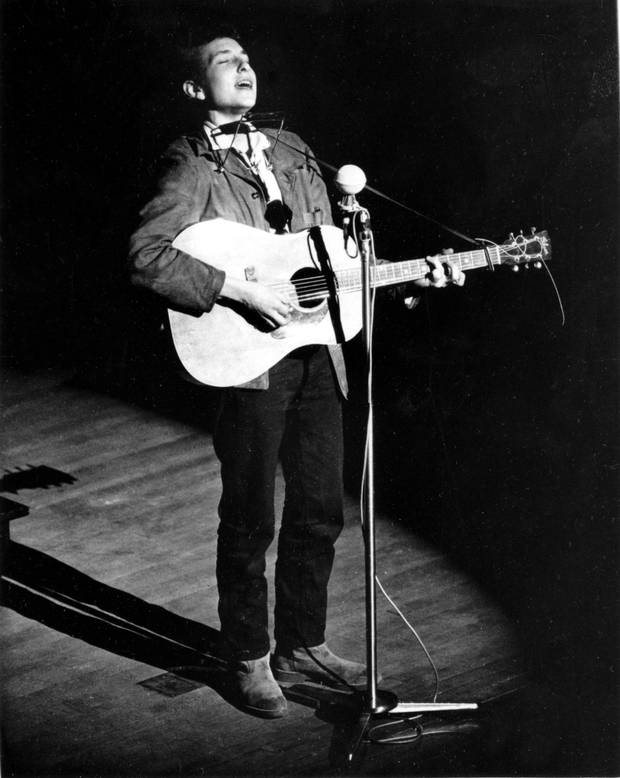
ASSOCIATED PRESS
Songwriter Bob Dylan won the 2016 Nobel Prize for literature on Thursday 'for having created new poetic expressions within the great American song tradition.' But in his early years, he didn't always feel his native country really got him – and in 1964, he appeared on a CBC documentary show, seizing an opportunity to get his songs to the masses on his own terms in ways he couldn't at home. On Feb. 1, 1964, arts critic Ralph Hicklin gave Globe and Mail readers a then-rare glimpse at Mr. Dylan's vision and his emerging celebrity status. Here is that report from our archives.
Bob Dylan, a 22-year-old entertainer from New York who rejects the designation of folk singer, has found in Canadian television a freedom to write and sing what he likes, a freedom refused him in his own country.
He is in Toronto to videotape a half-hour show in the Quest series; the telecast will consist simply of his singing songs of his own composition – songs which have been refused a hearing on such standbys as The Ed Sullivan Show. Sullivan, he explained, approved of the songs but executives of the Columbia Broadcasting System vetoed the performance.
Dylan – a slight, sensitive-faced man whose wardrobe runs to cowboy boots and denims – gave this reason why U.S. networks shy away from his songs:
"I see no attraction in the topics they sing about on TV or the radio – about I-love-you, or soapsuds. I'll tell you about one of the songs I'll sing on Quest. It's called The Lonesome Death of Hattie Carroll. It's a true story, about a wealthy guy in Maryland, who killed this maid at a big society party.
"Hattie Carroll was like nobody," he continued. "This guy had no reason, he just hit her with a cane and killed her. He got six months.
"I wrote a poem about it, then I sang the poem. About the killing, people cry and say, 'What a tragedy.' About the six months, they say 'Ooh' – and to me, that's the tragedy."
Summing up his aims in composing and singing, he said: "I sing about what's in my mind – about hung-up people caught up in real things. Why hide it? But they do hide it."
It's two years since Bob Dylan started writing and singing his own songs. Earlier, he had learned and sung folk songs, but that phrase, he said, was merely "a stage of learning, about people and things. Folk music gave me a sense of language."
Dylan feels that he is primarily a writer. He has completed 1,000 pages of a novel – "maybe it's half done, maybe a third" – and is working on a play. In addition, Macmillan has contracted to publish three books he is working on in conjunction with a photographer. The first, about Hollywood, will appear this spring.
"The people I identify with," he said, "the people who are trying to do what I try to do, are other writers, like Jimmy Baldwin and Allen Ginsberg.
"But I haven't reached the masses. I'm misunderstood by the masses. I'm not James Dean. People thought he dug culture because he carried a camera and liked poetry. But you never saw any pictures, nor any poems, he'd made. Instead of being a phony idol, I do write and I do things. Idols only make people sad when they break. I break twice a minute.
"I dig beauty. I get images. I gave up folk songs when I discovered Ain't Got No Use for Your Red Apple Juice didn't say anything for me. I didn't want to lose my images."
In the United States, he said, he does not talk with reporters; he always travels with friends to avoid reporters – especially since two national news magazines performed what he considers hatchet jobs on him.
"Reporters try to make what I do political. They want to make me a folk singer, and I'm not a folk singer. They want me to answer questions, and I won't answer questions.
"I'm not a preacher. I'm not a politician. If I didn't write, I'd go insane. I love my guitar; it's a friend. Sometimes I get the feeling I'd like to get inside it, and sing out through the sound hole."
then and now
Bob Dylan at a glimpse
from Reuters News Agency
Bob Dylan; singer, songwriter, Nobel laureate
0:58
1 Dylan began his career as an acoustic singer-songwriter specializing in protest songs. His first album was the eponymous Bob Dylan released in 1962.
2 Dylan created a controversy at the Newport, R.I., folk festival in 1965 when he set aside his accoustic guitar and played an electric guitar. He only played three songs and some in the crowd booed but it remains unclear if the booing was because of the electric guitar, the short set or bad audio quality. Still, many hard-core folk music fans felt betrayed. He was dubbed "Judas" by traditionalists.
3 Dylan dropped out of the public eye after a July, 1966, motorcycle accident. Few details about the crash were revealed but it allowed him to escape the mounting pressures of fame and he did not tour again for almost eight years.
4 Dylan has generally eschewed praise, including from critics and fans labelling him an artist, a poet or the voice of his generation. He has variously described himself as a trapeze artist, an "ashtray bender," a "rabbit catcher" and a "dog smoother."
5 Dylan is of Jewish heritage – his real name is Robert Zimmerman – but became a Christian in 1979 after a divorce. He released three albums of religious-based music, then mostly left off making overt references to Christianity in his songs until he surprised fans with a 2009 Christmas album.
If you really want to listen to some more Bob Dylan now, here are a few of his most notable songs over the years:


